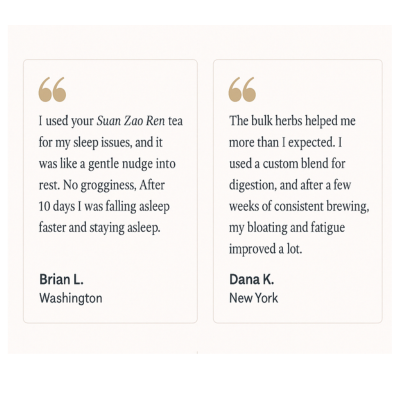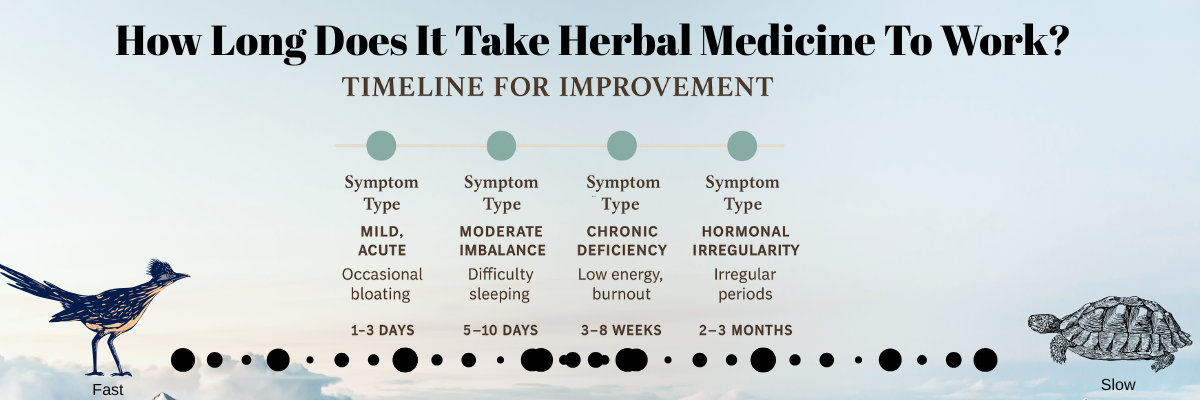Why Don’t Chinese Herbs Work Fast?
What You’re Not Being Told About Herbal Healing
Is This What You Think?
“I tried Chinese herbs, but I didn’t feel anything.”
You’re not alone. Many people expect herbs to work like over-the-counter meds—quickly, immediately, dramatically. But Traditional Chinese Medicine (TCM) has a very different goal: balance, not suppression.
Herbs vs. Western Medicine: What’s the Difference?
| Feature | Western Medicine | Chinese Herbal Medicine |
|---|---|---|
| Main Focus | Suppress symptoms | Treat root cause and balance Qi |
| Speed of Relief | Often fast (1–4 hours) | Gradual (can take days to weeks) |
| Healing Type | Temporary relief | Long-term body regulation |
| Side Effects | Often present | Generally minimal with proper use |
How Long Do Chinese Herbs Take to Work?
It depends on your condition and the herb used.
| Condition Type | Typical Timeline |
|---|---|
| Acute (e.g., sinus pressure) | 1–3 days (with proper herbs) |
| Mild imbalance (e.g., sleep issues) | 5–10 days |
| Chronic conditions | 4–12 weeks (minimum) |
Herbal healing is like gardening: it takes time, consistency, and care to see full results.
Fast-Acting Chinese Herbs (Yes, Some Work Quickly!)
If you're looking for quicker results, try these fast-acting herbs or teapills:
| Purpose | Herb Example | Form |
|---|---|---|
| Sleep & calm | Suan Zao Ren | Tea or teapill |
| Sinus pressure | Cang Er Zi | Decoction or capsule |
| Digestive upset | Chen Pi or Ginger | Tea or powder |
| Pain relief | Yan Hu Suo | Powder or formula |
How to Get Better Results with Chinese Herbs
-
Be consistent. Take herbs daily, at the same time.
-
Choose the right form. Teas may work faster, but teapills are more convenient.
-
Match the herb to the pattern. Work with a trained herbalist if possible.
-
Watch for gradual change. Energy, sleep, digestion, and emotional balance may shift slowly.
Teapills vs. Bulk Herbs: Which is Right for You?
| Feature | Teapills | Bulk Herbs |
|---|---|---|
| Prep Needed | None | Needs brewing or decoction |
| Strength | Moderate | Stronger (more potent) |
| Customization | Fixed formula | Fully customizable |
| Taste | Tasteless | Earthy, bitter, authentic |
| Best For | Beginners, travel | Chronic or complex cases |
What If It’s Not Working?
-
You may need a stronger formula or different combination.
-
Your issue may be chronic or deeply rooted, and needs time.
-
You could be using the wrong form (e.g., weak tea for a strong condition).
Don’t give up! Herbal healing is real. It just works differently.
Results Timeline Chart
| Symptom Type | Example Issue | Timeline for Improvement |
|---|---|---|
| Mild, acute | Occasional bloating | 1–3 days |
| Moderate imbalance | Difficulty sleeping | 5–10 days |
| Chronic deficiency | Low energy, burnout | 3–8 weeks |
| Hormonal irregularity | Irregular periods | 2–3 months |
Frequently Asked Questions (FAQ)
How long do Chinese herbs take to work?
Mild issues may show improvement within days. Chronic conditions usually require 4–12 weeks of consistent use.
Are teapills as effective as decoctions?
Teapills are convenient and great for maintenance. Decoctions (boiled herbs) are stronger and better for more serious or complex issues.
Can Chinese herbs work immediately?
Yes, some do! Herbs for sleep, digestion, or sinus relief can work within a few hours or days.
What should I do if I don’t notice any changes?
You may need a different formula, a stronger dose, or support from a practitioner. Herbal therapy is highly individualized.

Key Takeaway
Chinese herbs work—just not always instantly.
Their strength lies in long-term support, correcting imbalances, and promoting true healing. Be patient, consistent, and curious.
Ready to Try Chinese Herbs?
Shop By Category:
Teapills – Easy to Take Formulas
Bulk Herbs – Traditional, Customizable Healing
10 Vital Medicinal Herbs That Work Free E-Book: Introduction "10 Vital Medicinal Herbs That Work" is an e-book designed to educate anyone interested in herbal remedies.
“Medicine and food share the same origin.”
(药食同源 — Yào shí tóng yuán)
✨ Meaning:
This proverb reflects the core belief in Traditional Chinese Medicine (TCM) that food and herbs are both used to nourish, heal, and maintain balance in the body. In Chinese culture, the line between diet and medicine is intentionally blurred—every bite can be therapeutic.


